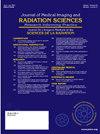Empowering Minds: A Quality Improvement Initiative on Educating Radiation Therapists on Navigating Difficult Conversations Surrounding Anxiety and Depression in Palliative Patients
IF 1.3
Q3 RADIOLOGY, NUCLEAR MEDICINE & MEDICAL IMAGING
Journal of Medical Imaging and Radiation Sciences
Pub Date : 2025-05-01
DOI:10.1016/j.jmir.2025.101952
引用次数: 0
Abstract
Purpose/Aim
Radiation Therapists are knowledgeable and confident in supporting patients with anxiety and depression based on recognizing the signs and symptoms, discussing anxiety and depression and providing emotional support. However, when it comes to referring patients for additional support such as Psychosocial Oncology (PSO) or community programs, there is a knowledge gap. It is important for Radiation Therapists (RT) to have this knowledge so that they can better support the mental health needs of their patients and ensure they receive the additional support to get them through their radiation treatments. The aim of this project was to increase the number of psychosocial support referrals and disseminated psychosocial toolkits in palliative patients receiving fractionated radiation treatment with an ESAS score of 7 or more by 70% by March 2024.
Methods/Process
This change idea engaged two focus groups –RTs & patients from October 2023 – December 2024. Within the RT focus group, a needs assessment survey was conducted and based on the responses a series of webinars and resources were developed to meet the interest of RTs. Following the delivery of these resources, a survey was sent out to staff to evaluate the effectiveness of the resources in increasing confidence among staff. The second focus group was patient – driven where 10 palliative patients were interviewed on interest in learning about community support programs. A 1-pager document (psychosocial toolkit) was developed highlighting community support programs of interest. This document was shared with staff to give to palliative patients with an ESAS score of 7 or more.
Results or Benefits/Challenges
The results showed that there is still work to be done in ensuring that RTs still have these conversations, however through the process measures it was identified that there is an increase in interest among RTs in having these conversations and to learn more. Despite competing learning demands, there was still engagement among staff. One challenge was low attendance for some of the webinars/workshops due to scheduling conflicts. However, a number of these webinars were recorded and as a result we have created a diverse repository of resources for staff to refer to. Another challenge was that it was difficult to measure the number of community referrals that were generated through this initiative.
Conclusions/Impact
Since the implementation of this initiative the number of PSO referrals in our institution has increased to 29 referrals (November 2023 – December 2024) in comparison to 5 from November 2022 – February 2023. Among this group only 3 of the patients had an ESAS score of 7 or more, which shows the impact of having these discussions with patients regardless of their ESAS scores. After the webinars, there was an increase in RT confidence levels (N=30, 58%) in entering Epic referrals and referring patients to community programs. Interestingly, many RTs expressed interest in learning more about PSO supports through webinars.
授权思想:教育放射治疗师在缓和病人焦虑和抑郁的困难对话中导航的质量改进倡议
目的/目的放射治疗师在认识症状和体征、讨论焦虑和抑郁以及提供情感支持的基础上,对焦虑和抑郁患者的支持是有知识和自信的。然而,当涉及到将患者转介到额外的支持,如心理社会肿瘤学(PSO)或社区项目时,存在知识差距。对于放射治疗师(RT)来说,了解这些知识非常重要,这样他们才能更好地支持患者的心理健康需求,并确保他们得到额外的支持,以完成放射治疗。该项目的目的是到2024年3月,将接受分级放射治疗的ESAS评分为7分或以上的姑息治疗患者的社会心理支持转诊和传播社会心理工具包的数量增加70%。方法/过程这个改变想法涉及两个焦点小组-RTs &;患者从2023年10月至2024年12月。在RT焦点小组中,进行了需求评估调查,并根据回应开发了一系列网络研讨会和资源,以满足RT的兴趣。在交付这些资源之后,向工作人员发出了一份调查,以评价这些资源在提高工作人员信心方面的有效性。第二个焦点小组是由患者驱动的,其中10名姑息治疗患者对了解社区支持计划的兴趣进行了采访。制定了一份1页的文件(社会心理工具包),重点介绍了感兴趣的社区支持计划。该文件与工作人员共享,以提供给ESAS评分为7或以上的姑息治疗患者。结果或利益/挑战结果表明,在确保RTs仍然进行这些对话方面仍有工作要做,但是通过过程测量,可以确定RTs对进行这些对话和学习更多内容的兴趣有所增加。尽管有相互竞争的学习需求,但员工之间的参与度仍然很高。其中一个挑战是由于日程冲突,一些网络研讨会/研讨会的出席率很低。然而,其中一些网络研讨会被记录下来,因此我们创建了一个多样化的资源库,供员工参考。另一个挑战是,很难衡量通过这一举措产生的社区转诊数量。结论/影响自实施这一举措以来,我们机构的PSO转介数量已增加到29个转介(2023年11月至2024年12月),而2022年11月至2023年2月为5个。在这组患者中,只有3名患者的ESAS评分为7分或更高,这表明与患者进行这些讨论的影响与他们的ESAS评分无关。在网络研讨会之后,进入Epic转诊和转诊患者到社区项目的RT置信水平(N= 3058%)有所增加。有趣的是,许多RTs表示有兴趣通过网络研讨会了解更多关于PSO支持的信息。
本文章由计算机程序翻译,如有差异,请以英文原文为准。
求助全文
约1分钟内获得全文
求助全文
来源期刊

Journal of Medical Imaging and Radiation Sciences
RADIOLOGY, NUCLEAR MEDICINE & MEDICAL IMAGING-
CiteScore
2.30
自引率
11.10%
发文量
231
审稿时长
53 days
期刊介绍:
Journal of Medical Imaging and Radiation Sciences is the official peer-reviewed journal of the Canadian Association of Medical Radiation Technologists. This journal is published four times a year and is circulated to approximately 11,000 medical radiation technologists, libraries and radiology departments throughout Canada, the United States and overseas. The Journal publishes articles on recent research, new technology and techniques, professional practices, technologists viewpoints as well as relevant book reviews.
 求助内容:
求助内容: 应助结果提醒方式:
应助结果提醒方式:


